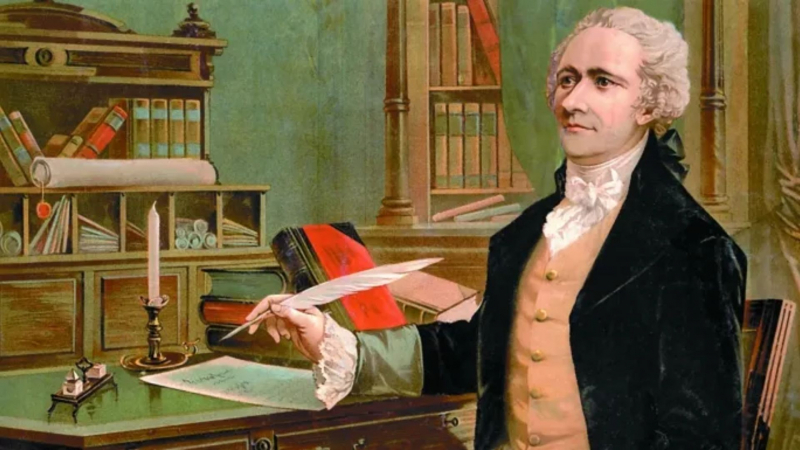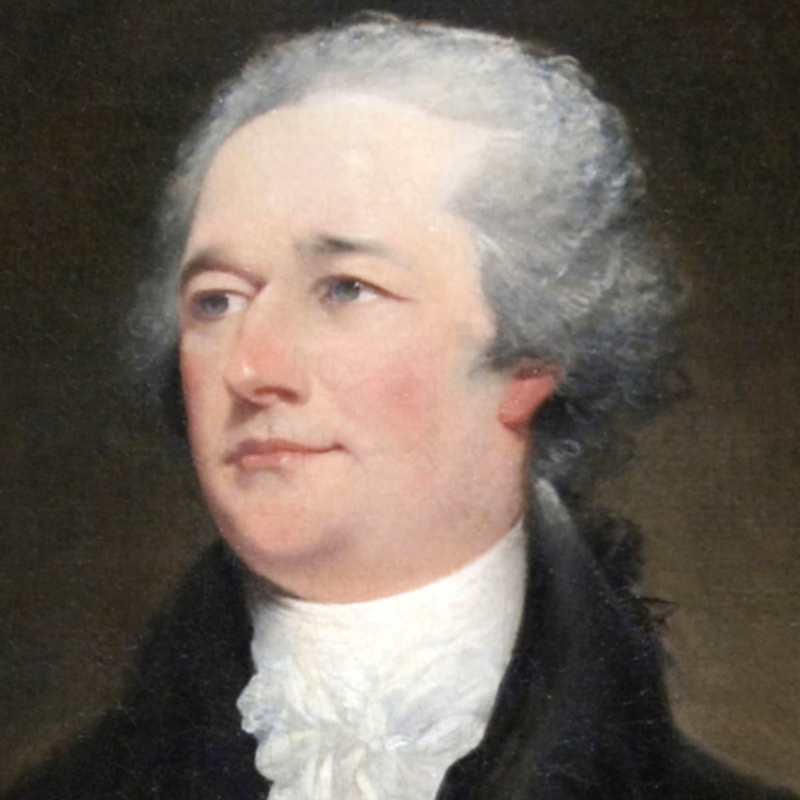Alexander Hamilton

Alexander Hamilton (1755-1804), a soldier, economist, and lawyer was a Founding Father. He was the first United States Secretary of the Treasury and was in charge of George Washington's economic policies. He built a national bank, and a debt-repayment mechanism, and negotiated trade agreements with the United Kingdom. During the American Revolution, he was George Washington's confidant. “The sacred rights of mankind are not to be rummaged for among old parchments or musty records. They are written, as with a sunbeam, in the whole volume of human nature, by the Hand of Divinity itself, and can never be erased or obscured by mortal power.” – Alexander Hamilton
Alexander Hamilton, born into obscurity in the British West Indies, rose to prominence during the Revolutionary War and became one of America's most significant Founding Fathers. He was an ardent supporter of a strong federal government and was instrumental in defending and ratifying the United States Constitution.
As the first Secretary of the United States Treasury, Hamilton laid the financial groundwork for the new nation, against stiff opposition from archrival Thomas Jefferson. The two men's differences would help shape the nation's first political party. Hamilton's controversial political style (and an embarrassing sex scandal) restricted his latter career chances, and he was assassinated in a duel in 1804 by Aaron Burr, another lifelong political opponent.
Hamilton's father abandoned the family in 1766, and two years later his mother died. Hamilton, who was hired as a clerk in a trading company on St. Croix at the age of 11, rose to prominence after publishing an expressive letter detailing a hurricane that ravaged the island in 1772. Locals raised funds to send him to America to study, and he arrived in New York in late 1772, just as the colonies were preparing for war with Great Britain.
Hamilton became interested in the colonial cause while studying at King's College in New York (now Columbia University), publishing pamphlets such as "A Full Vindication of the Measures of Congress," in which he backed the First Continental Congress' plan to embargo trade with Britain. When the Revolutionary War broke out, he was commissioned to captain an artillery company in the Continental Army and fought valiantly in battles such as Trenton and Princeton. By 1777, he had piqued the interest of the army's commander-in-chief, General George Washington, who appointed him to his staff.
Hamilton's writing abilities and military acumen enabled him to prosper as Washington's aide-de-camp, and he established a reputation in Revolutionary-era society. He married Elizabeth Schuyler, the daughter of a wealthy and powerful New York landowner and military commander, in 1780. They had eight children, and she remained a crucial source of loyalty and stability for him throughout the many turbulent years that followed.
Hamilton resigned from Washington's staff in 1781 but returned to the army later that year when Washington assigned him a field command at the Battle of Yorktown. Hamilton performed admirably in that pivotal battle, commanding a successful assault that contributed to the capitulation of British General Lord Charles Cornwallis.
Hamilton was appointed by George Washington in 1781 to command a light infantry battalion in Marquis de Lafayette's Division, and he helped lead the charge in the Conflict of Yorktown in Yorktown, Virginia, the war's final major land battle. The siege lasted from September 28 to October 19, 1781, with the French attacking Redoubt 9 and Hamilton attacking Redoubt 10 at the same time. British General Charles Cornwallis surrendered as a result of the two-pronged attack.
Following the war, Hamilton studied law, passed the New York bar, and established himself as an attorney in New York City. Hamilton was chosen as one of three delegates from New York to a federal conference in Philadelphia in 1787 to rewrite the Articles of Confederation. He famously delivered a six-hour lecture outlining his own idea for a highly centralized government, prompting accusations that he planned to establish a monarchy.
Though Hamilton had little impact on the Constitution itself, he was instrumental in its ratification. Hamilton, together with James Madison and John Jay, wrote a series of 85 essays defending the new Constitution to the American people. Hamilton wrote 51 of these Federalist Papers, which became his most well-known works.
Washington was unanimously elected the first President of the United States in 1789, and he appointed Hamilton as the first Secretary of the United States Treasury. Hamilton argued for the significance of a national banking system and the federal government's assumption of state debts in order to secure long-term financial stability for the new nation. Hamilton's financial policies were strongly opposed by Madison and Thomas Jefferson, then secretary of state, who believed they gave the federal government far too much authority.
The First Bank of the United States, founded in 1791 and modeled after the Bank of England, succeeded in fuelling economic expansion and marked the pinnacle of Hamilton's influence on the fledgling nation. Meanwhile, the debate over the balance of power between the federal government and the states raged on within Washington's cabinet. When war broke out between the United Kingdom and France in 1793, the schism between Hamilton (who preferred neutrality) and Jefferson (who wanted the United States to support France) had begun to establish the nation's first political parties, the Federalists and the Democratic-Republicans.
Hamilton's legacy rose to prominence centuries later with the premiere of the landmark musical Hamilton. The performance, composed and performed by Lin-Manuel Miranda, combined hip-hop and Broadway to provide a new perspective on the Founding Father's biography. It dominated the 2016 Tony Honors, taking home 11 awards. A video version of the musical will air on Disney+ in July 2020.


























